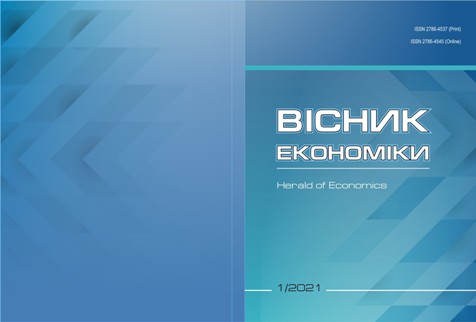Determinants and factors of influence of intellectual potential on the country’s digital competitiveness and business mobility
DOI:
https://doi.org/10.35774/visnyk2025.01.041Keywords:
digital competitiveness, digital entrepreneurship, economic growth, intellectual potential, human capital, knowledge, education, scientific research, innovative economyAbstract
Introduction. Digital changes inherent in modern economic relations require conscious perception by all economic participants and rapid adaptation to them. The development of intellectual human capital, digital entrepreneurship and innovativeness of the economy, based on expanding existing knowledge, revealing talents, and strengthening scientific research, are becoming an indisputable condition.
Purpose. Assessment of the influence of factors on the digital competitiveness of countries, substantiation of the importance of human potential for the effectiveness of digital entrepreneurship, as well as determining priorities for the development of education with the use of digital technologies.
Methods. When studying the existing developments in understanding digital competitiveness, factors and subfactors that influence it, methods of analysis and synthesis were used. Graphical and statistical methods allowed us to visually present the ratings of digital competitiveness of countries in the world in terms of subfactors in 2019, 2021 and 2023. Comparison and generalization methods contributed to comparing the levels of digital competitiveness of individual countries in the world in 2019, 2021, and 2023, as well as identifying the role of human resources in the development of an innovative economy, digital entrepreneurship, strengthening business mobility, and digital competitiveness.
Results. It was found that the strengthening of the country’s digital competitiveness and the development of digital entrepreneurship in it are influenced by three levels of technological transformations – organizational, institutional, and structural. The ranking positions of countries’ digital competitiveness according to “Knowledge” criterion of the IMD World Digital Competitiveness Ranking in 2019, 2021, and 2023 were analyzed and it was found that the leadership here is maintained by the USA, Singapore, Switzerland, and Sweden. The subfactors “Talent”, “Education and Training”, “Scientific Concentration” of the “Knowledge” criterion of the ranking of digital competitiveness of countries are characterized, which showed that the balance of digital changes in the economy directly depends on the intellectual potential of human capital, its ability to generate new knowledge and ideas, to constantly learn and self-develop.
Perspectives. Prospects for further research consist in developing practical measures to restore the countryʼs potential for economic growth, high-tech and innovative development, as well as developing ways to strengthen its intellectual human capital.
References
Kiselakova, D., Sofrankova, B., Gombar, M., & Matijova, M. (2024). Modelling the impact of innovation performance on digital competitiveness: The key role of innovation and technologies. Asian Economic and Financial Review, 14(4), 295–311. DOI: https://doi.org/10.55493/5002.v14i4.5020. [in English].
Bris, A., Cabolis, Ch., & Caballero, J. (2017). The IMD World Digital Competitiveness Ranking. How does your country rank? IMD. RESEARCH & KNOWLEDGE, September 2017. Retrieved from https://imd.widen.net/view/pdf/vldyri8qcm/tc050-17.pdf. [in English].
Chaliuk, Yu. O. (2020). Tsyfrova konkurentospromozhnist krain [Digital competitiveness of countries]. Infrastruktura rynku – Market infrastructure, 50, 22–30. DOI: https://doi.org/10.32843/infrastruct50-4. [in Ukrainian].
Ernawati, E., Natsir, M., & Asri, M. (2024). Do Digital Competitiveness and Government Efficiency Affect Macroeconomy? An Evidence from Asia Pacific Countries. Etikonomi, 23(2), 481–496. DOI: htttps://doi.org/10.15408/etk. v23i2.34339. [in English].
Hurduzeu, G., Lupu, I., Lupu, R., & Filip, R. I. (2022). The Interplay between Digitalization and Competitiveness: Evidence from European Countries. Societies, 12, 157. DOI: https://doi.org/10.3390/soc12060157. [in English].
Grosu, V., Andrioaia, I., & Tiganas, I.-M. (2023). The influence of the digital revolution on sustainable competitiveness. Case study for Eastern European countries. European Journal of Accounting, Finance & Business, 11(2), 61–67. DOI: https:// doi.org/10.4316/EJAFB.2023.1128. [in English].
Marti, L., & Puertas, R. (2023). Analysis of European competitiveness based on its innovative capacity and digitalization level. Technology in Society, 72, 102206. DOI: https://doi.org/10.1016/j.techsoc.2023.102206. [in English].
Lixandroiu, D. (2018). Digital competitiveness indicators and the e-government process in Romania. Journal of smart economic growth, 3(2), 107–122. [in English].
Kuncova, M., Berkova, K., Frendlovska, D., Fureder, R., Uberwimmer, M., & Haas, B. (2014). Digital competitiveness in the Czech Republic and Austria. Interreg. Austria – Czech Republic. European Regional Development Fund. 12 p. Retrieved from https://2014-2020.at-cz.eu/data/projects/f/89/673.pdf [in English].
Ko, A., Mitev, A., Kovacs, T., Feher, P., & Szabo, Z. (2022). Digital Agility, Digital Competitiveness, and Innovative Performance of SMEs. Journal of Competitiveness, 14(4), 78–96. DOI: https://doi.org/10.7441/ joc.2022.04.05. [in English].
Botti, A., Parente, R., & Vesci, R. (Eds.) (2023). How to do business in digital era? A casebook. Second edition. Salerno-Cracow: Cracow University of Economics. Retrieved from https://ted.uek.krakow.pl/output-2-the-casebook-how-to-do- business-in-digital-era/. [in English].
Magliocca, P. (Eds.) (2023). Doing business digitally. A textbook. Second edition. Foggia-Cracow: Malopolska School of Public Administration, Cracow University of Economics. Retrieved from https://ted.uek.krakow.pl/output-2-the-textbook-doing- business-digitally/. [in English].
Digital Competitiveness (2024). Lark Editorial Team. Lark: website, April 17, 2024. Retrieved from https://www.larksuite.com/en_us/topics/digital-transformation- glossary/digital-competitiveness. [in English].
Marcus, J. S., & Rossi, M. A. (2024). Strengthening EU digital competitiveness: stoking the engine. EUI; RSC; Research Report; Centre for a Digital Society. European University Institute. Retrieved from https://hdl.handle.net/1814/76877. [in English].
Santoso, F. Y. E., Samputra, P. L., & Daryanto, E. (2024). Digital Competitiveness and Economic Resilience. Asian Journal of Engineering, Social and Health, 3(7), 1536–1548. DOI: https://doi.org/10.46799/ajesh.v3i7.353. [in English].
World Digital Competitiveness Ranking 2023 (2024). IMD. World Competitiveness Center. Retrieved from https://www.imd.org/centers/wcc/world-competitiveness- center/rankings/world-digital-competitiveness-ranking/. [in English].
Mlynarzewska-Borowiec, I. (2022). Digital Competitiveness Gap between the US and EU Member States in the 21st Century. European Resaerch Studies Journal, XXV(4), 364–380. DOI: https://doi.org/10.35808/ersj/3087. [in English].
Na Kirovohradshchyni vidbuvsia forum Central Ukrainian Digital Event 2024 [The Central Ukrainian Digital Event 2024 forum was held in the Kirovohrad region] (2024). Diia: website, May 22, 2024. Retrieved from https://hromada.gov.ua/post/ na-kirovogradshhini-vidbuvsya-forum-central-ukrainian-digital-event-2024. [in Ukrainian].
Laitsou, E., Kargas, A., & Varoutas, D. (2020). Digital Competitiveness in the European Union Era: The Greek Case. Economies, 8(4), 85. DOI: https://doi. org/10.3390/economies8040085. [in English].



